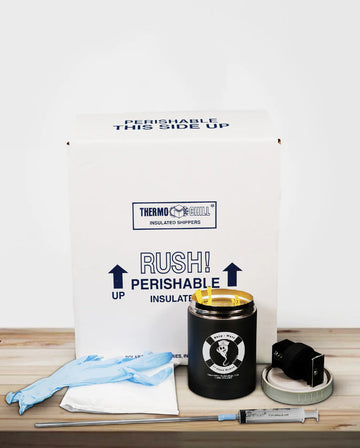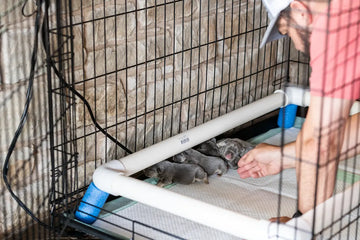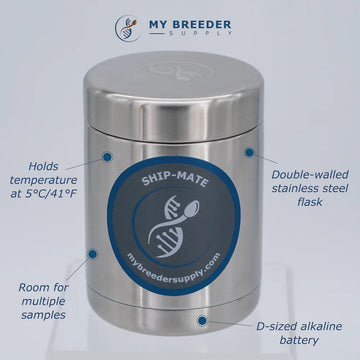Everything You Need to Know About Dog Pregnancy Tests
by Phenyx Media on Apr 19, 2023

When your canine companion is expecting, it's essential to know as early as possible to provide her with the best care. Dog pregnancy tests are an effective way to confirm whether your dog is pregnant or not. In this article, we'll discuss everything you need to know about these tests, from their importance to different types and how to interpret the results.
Why Test for Dog Pregnancy?
Recognizing Signs of Pregnancy
It's not always easy to tell if your dog is pregnant just by observing her behavior. Some common signs include increased appetite, weight gain, and nesting behavior, but these can also occur for other reasons. By using a pregnancy test, you can confirm your suspicions and provide the appropriate care.
Importance of Prenatal Care
Prenatal care is vital to ensure the health of your dog and her puppies. Early detection of pregnancy allows you to adjust her diet, exercise, and monitor her health more closely.
Types of Dog Pregnancy Tests

There are several ways to test for dog pregnancy, each with its benefits and limitations.
Blood Test
A blood test can detect pregnancy by measuring the hormone relaxin, which is only produced during pregnancy. It's accurate and can be done as early as 22-27 days after breeding.
Ultrasound
An ultrasound is a non-invasive procedure that uses sound waves to create an image of your dog's uterus. It can detect pregnancy as early as 21-30 days after breeding and can provide information about the number of puppies and their health.
X-ray
An X-ray is another diagnostic tool that can detect pregnancy by revealing the puppies' skeletons. It's usually performed around day 45 of pregnancy, as the skeletons are not visible before this time.
How to Perform a Dog Pregnancy Test
Vet Assistance
The most reliable way to test for dog pregnancy is through a veterinarian. They can perform the blood test, ultrasound, or X-ray and provide expert advice on prenatal care.
At-Home Testing
At-home dog pregnancy tests are not currently available. While human pregnancy tests work by detecting a specific hormone, this method is not applicable to dogs, and using a human test will yield inaccurate results.
Interpreting the Results
Positive Results
A positive result indicates that your dog is pregnant. You should follow your veterinarian's advice regarding prenatal care, including diet, exercise, and any necessary supplements. Keep a close eye on your dog's health and maintain regular checkups to ensure a healthy pregnancy.
Negative Results
A negative result means that your dog is not pregnant. If you still suspect she may be pregnant due to her behavior or physical changes, consider retesting or consulting with your veterinarian. False negatives can occur, especially if the test is performed too early in the pregnancy.
Caring for Your Pregnant Dog
Nutrition
Proper nutrition is crucial during pregnancy to support your dog's health and the development of her puppies. Consult with your veterinarian to determine the appropriate diet, which may include switching to a higher-quality or specific pregnancy dog food. Gradually increase her food intake, particularly during the last trimester.
Exercise
While exercise is essential for a healthy dog, you should adjust her routine during pregnancy. Regular, gentle exercise can help maintain her muscle tone and overall health.
When to Limit Activity
As your dog's pregnancy progresses, she may become less active and require shorter, less intense walks. It's essential to monitor her for signs of fatigue and adjust her exercise accordingly.
Preparing for Birth
As your dog's due date approaches, you should prepare a whelping box or area for her to give birth. This should be a quiet, comfortable space with soft bedding and easy access to food and water. Keep a close eye on her during the final days of pregnancy, and contact your veterinarian if you notice any complications or concerns.
Understanding dog pregnancy tests and how to care for your pregnant dog is essential to ensuring a healthy pregnancy and birth. By detecting pregnancy early, you can provide the appropriate care, including proper nutrition and exercise adjustments. Remember to consult with your veterinarian throughout the process and follow their expert advice.
My Breeder Supply: Your Trusted Source for Dog Pregnancy Tests
If you're looking for reliable dog pregnancy tests, My Breeder Supply is the best place to find them. As a leading provider of quality breeding supplies, My Breeder Supply offers a range of services to support dog breeders and owners throughout the pregnancy journey.
Why Choose My Breeder Supply?
My Breeder Supply provides high-quality, veterinarian-approved pregnancy tests, giving you the confidence to make informed decisions about your dog's health. With an experienced team of experts, they can guide you through the testing process and help you interpret the results accurately.
Range of Services
In addition to dog pregnancy tests, My Breeder Supply offers a wide range of products and services for breeders, including whelping supplies, nutritional supplements, and expert advice. By choosing My Breeder Supply, you can ensure your dog and her puppies receive the best care possible throughout the pregnancy and beyond.
FAQs About Dog Pregnancy Tests
1. How long is a dog's pregnancy?
A dog's pregnancy typically lasts around 63 days, although this can vary by a few days depending on the breed and individual dog.
2. Can human pregnancy tests work on dogs?
No, human pregnancy tests will not work on dogs, as they detect a specific hormone not present in dogs during pregnancy.
3. When should I take my dog to the vet for a pregnancy test?
It's best to consult with your veterinarian for the appropriate time to test for pregnancy, as this can vary depending on the test method. Blood tests and ultrasounds can be performed as early as 22-30 days after breeding.
4. How can I tell if my dog is going into labor?
Some signs that your dog may be going into labor include restlessness, nesting behavior, panting, and a drop in body temperature. Contact your veterinarian if you have any concerns or questions during this time.
5. Is it necessary to have a veterinarian present during my dog's labor?
It's not always necessary to have a veterinarian present during labor. However, it's essential to be prepared to contact your veterinarian in case of any complications or concerns. Make sure to have their contact information readily available during this critical time.




